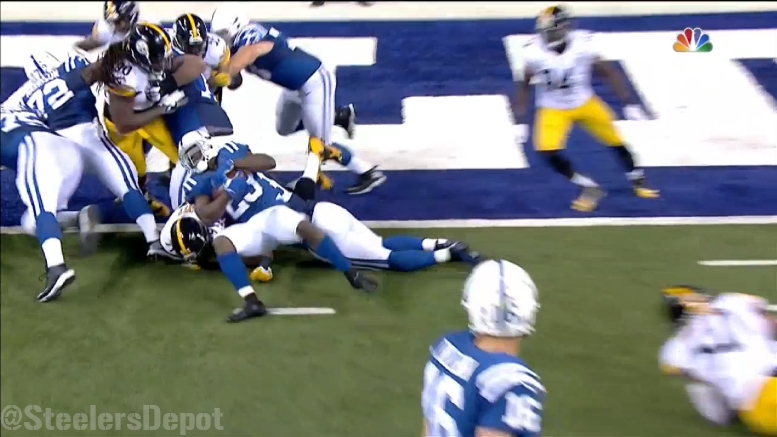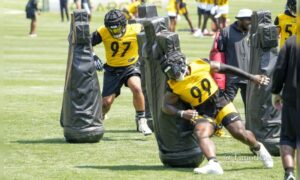Heading into the bye week, the Pittsburgh Steelers knew that they had a run defense problem that they needed to solve. For much of the game, it looked as though they may have managed to do just that, and do so against the best rushing team in the league in the Cowboys, but their late success, including two long touchdown runs to clinch the game, ended such illusions.
The Steelers also lost Cameron Heyward in that game, and that did not bode well, as the team’s run defense had a disappearing act when he missed two games earlier in the season. But instead of taking a major step back, the run defense has been quite successful over the course of the past week, including last night’s victory over the Colts.
On Sunday, against the Browns, Cleveland was not much interested in running the ball, in part because they were playing from behind, but their running backs only accounted for 10 total carries in the game, gaining a combined 20 yards, which, obviously, averages out to two yards per carry. Including three quarterback scrambles, the Browns rushed for just 33 yards on 13 rushes for an abysmal 2.5 yards per carry, and suffered four rushes that went for negative yardage.
While the Colts put up some more palatable statistics, the raw numbers are deceiving, as a hefty amount of that workload was gained in garbage time, during the final two minutes of a game in which the Steelers were leading by 21 points. On the final three plays of the game, former Steelers running back Jordan Todman rushed three times for 37 yards.
To put that in perspective, those 37 yards accounted for 40 percent of the Colts’ total for the game. Up to that point, when the game was arguably competitive, they had rushed for just 54 yards, and did so on 20 rushes. They were gaining just 2.7 yards per carry when it actually mattered.
Even with Todman’s garbage time yardage, the Colts merely climbed up to four yards per carry, although, unlike the Browns, they were able to stay away from negative plays, suffering a loss of just one yard on one negative run.
Of particular note is the work that the front seven did on veteran running back Frank Gore, who gained just 28 yards on 15 carries, averaging less than two yards per rush. The Steelers did allow Robert Turbin an 18-yard run on a toss that converted a third down, which was the biggest run fail of the game for Pittsburgh.
But the Colts had just two runs of 10 yards or more throughout the game, including Turbin’s run, and the other was a 19-yard run by Todman on the final play of the game. Those are some impressive numbers for a run defense that has been questionable at best at times. They even limited quarterback Scott Tolzien to six yards on three scrambles, two of which kept him out of the end zone.








